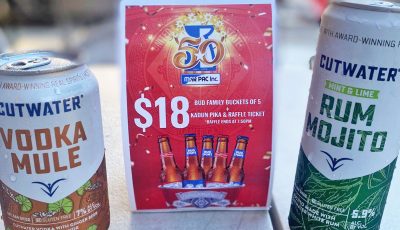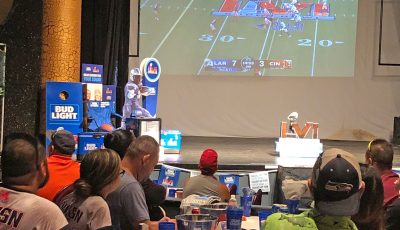IN LAWSUIT VS LAWYERS LUJAN, ISRAEL
Manglona issues ruling favorable to Hillbroom
U.S. District Court for the NMI Chief Judge Ramona V. Manglona has issued a ruling favorable to Junior Larry Hillbroom, who is suing his two previous lawyers for allegedly conspiring with his former trustee to inflate the attorney’s contingency fee when late business tycoon Larry Hillblom’s fortune was still undergoing probate proceedings.
Manglona ruled that all of grounds asserted by attorneys David J. Lujan and Barry J. Israel in their motion for judgment on the pleadings failed.
In denying Lujan and Israel’s motion, Manglona said Hillbroom’s claims are not precluded as res judicata, do not violate the Full Faith and Credit Clause, and are not subject to the Rooker-Feldman doctrine.
Res judicata doctrine bars litigation in a subsequent action of any claims that were raised or could have been raised in the prior lawsuit.
Under the Full Faith and Credit Clause doctrine, a party is precluded from re-litigating claims and issues that were already decided in any U.S. court. This preclusive effect is sometimes referred to as res judicata.
Rooker-Feldman doctrine bars federal district courts from entertaining appeals of state court judgments.
Courts grant judgment on the pleadings “when there is no issue of material fact in dispute, and the moving party is entitled to judgment as a matter of law.”
With Manglona’s ruling, it means that Hillbroom’s lawsuit against Lujan and Israel will proceed.
In their motion, Lujan and Israel asserted that judgment should enter in their favor because the relief Hillbroom is seeking would require the federal court to engage in improper appellate review of final orders of the Guam Superior Court and exceed its authority by altering or vacating those orders.
The Vietnam-based Israel and Guam lawyer Lujan used to serve as counsels for Hillbroom in the late Hillblom’s probate matter in Superior Court. Hillbroom is the DNA-proven son of Hillblom.
Hillblom died in a plane crash off Anatahan waters in 1995.
Approximately $100 million in assets were distributed to Hillbroom in the settlement of the probate case for Hillblom estate. Since Hillbroom was a minor at the time of the settlement, the Junior Larry Hillbroom Trust (JLH Trust) was created for him.
Hillbroom alleges that in 2001 his lawyers, Israel and Lujan, together with JLH trustee Keith Waibel, conspired to wrongfully increase their contingency fee in his recovery from the Hillblom estate from 38 percent to 56 percent, and thereby to drain the trust of millions of dollars.
It is alleged that the conspiracy was effectuated through fraud and involved breaches of fiduciary duty to Hillbroom and his guardians, especially his grandmother, Naoko Imeong.
In denying defendants’ motion, Manglona said in Lujan’s and Israel’s view, the exercise of subject matter jurisdiction by federal court would violate the Full Faith and Credit Clause of the U.S. Constitution and the so-called Rooker-Feldman doctrine, which bars federal district courts from entertaining appeals of state court judgments.
Manglona said the Guam court orders that defendants Lujan and Israel allege Hillbroom is collaterally attacking are the following:
•1995 order approving Junior’s grandmother as his guardian.
•A 1998 order establishing a trust account for interim payments to Junior.
•A 1999 order approving the JLH Trust, with Waibel as trustee, and payment of attorney fees and costs.
•A 1999 order or a preliminary distribution from the Hillblom estate to JLH Trust.
•A 2000 order approving Waibel as Junior’s off-island guardian.
•A 2001 order approving the 56 percent JLH Trust fee agreement.
•Four 2001-2 orders approving Waibel’s accounting.
According to defendants, Hillbroom is “improperly asking this court (federal court) to vacate these Guam court orders and re-adjudicate the propriety of the accountings, expenditures and actions taken by the protectors…”
In response, Hillbroom asserted he is not seeking to invalidate any orders other than the 2001 order approving the 56 percent fee.
As to that order, Hillbroom noted that a federal court has the power to set aside a state-court order that was obtained by extrinsic fraud, and asserts that he has sufficiently pled extrinsic fraud.
Defendants denied that Hillbroom has adequately pled extrinsic fraud.
But Manglona agreed with Hillbroom that the only Guam court order that is arguably under collateral attack is the 2001 order approving the 56 percent fee agreement.
Manglona said if Hillbroom wins this lawsuit, that Guam 2001 order alone will effectively be made a nullity.
Manglona said Hillbroom is not seeking to roll back any of the other orders.
Under the Full Faith and Credit Act, the judge said, any court within the United States must give “the same full faith and credit” to any judicial act as that act has in the state, territory, or possession that issued it.
Manglona said Hillbroom has complained that defendants concealed their self-dealing from him, fraudulently induced his guardians to backdate the 56 percent retainer agreement, and submitted a report falsely justifying the fee.
“Any of this conduct, if proved, would constitute extrinsic fraud,” Manglona pointed out.
Manglona said defendants’ arguments to the contrary are unconvincing.
First, the judge said, defendants assert that because at the time of the events in question Hillbroom was a minor, he had no power to consent to the retainer agreement and any fraudulent concealment from him would have no legal consequence.
Even if that were true, Manglona said, the complaint alleges that defendants kept information not only from Hillbroom but also from his guardian and grandmother Naoko Imeong.
Second, Manglona said, the defendants maintain that because the Guam court approved the very payments that fraudulently (according to Hillbroom) induced Imeong to go along with the backdating, a finding in Hillbroom’s favor would necessarily impute that the Guam court itself was corrupt.
That conclusion, Manglona pointed out, doesn’t follow from the premise.
Manglona said undue influence on his guardians would have deprived Hillbroom of a full and fair “opportunity to present his case in court.”
Third, the judge said, defendants insist that because the report Hillbroom claimed was false was reviewed by the Guam court this action improperly seeks appellate review of the Guam court’s order.
Manglona said Hillbroom, however, has alleged that the falsified report prevented him and his guardian Imeong from recognizing that the 56 percent fee was unjustified, thus depriving her of an opportunity to appeal on those grounds.
“That’s extrinsic fraud,” Manglona said.
For these reasons, Manglona said, after an independent review of the pleadings and moving papers, she finds that District Court Judge David O. Carter’s ruling that res judicata does not bar Hillbroom’s claims is well supported and deserves to be followed.
Defendants asserted that their full faith and credit defense is distinct from the preclusion claim that Judge Carter analyzed.
Manglona said generally speaking, however, full faith and credit merely extends the common law doctrine of res judicata so as to prevent claims that have already been addressed in state court from being wastefully re-litigated in federal court.
Defendants, she said, have not articulated a theory as to how their full faith and credit defense differs from res judicata.
Therefore, Manglona said, the court finds no basis in the Full Faith and Credit Clause to grant defendant’s motion for judgment on the pleadings.
Defendants also asserted that Junior’s federal lawsuit is barred because he is asking the district court to overturn a state court judgment—the 2001 Guam order approving the 56 percent fee—in violation of the jurisdictional limitation announced in Rooker-Feldman cases.
Manglona said Rooker-Feldman does not bar Hillbroom’s lawsuit, for two reasons.
First, she said, Hillbroom is not a “state-court loser.”
In the Guam court in 2001, Manglona said, Hillbroom was not defendants’ adversary.
Rather, the judge said, in the Hillblom probate and guardianship cases, defendants were attorneys representing Hillbroom’s interests.
Manglona said the fact that Hillbroom now feels that defendants “sold out [his] interests” and “connived at his defeat” does not turn him into the losing party of a state-court contest.
Second, the judge said, Hillbroom does not seek to set aside the 2001 order based on legal errors by the Guam court, but because of defendants’ extrinsic fraud.
“Extrinsic fraud on the court is, by definition, not an error by that court. It is, rather, a wrongful act committed by the party or parties who engaged in the fraud,” Manglona said, citing a case law.
Manglona said as Hillbroom has sufficiently alleged extrinsic fraud, therefore, although this lawsuit may be a de facto appeal of the 2001 Guam court order, it is not barred by the Rooker-Feldman doctrine.



























